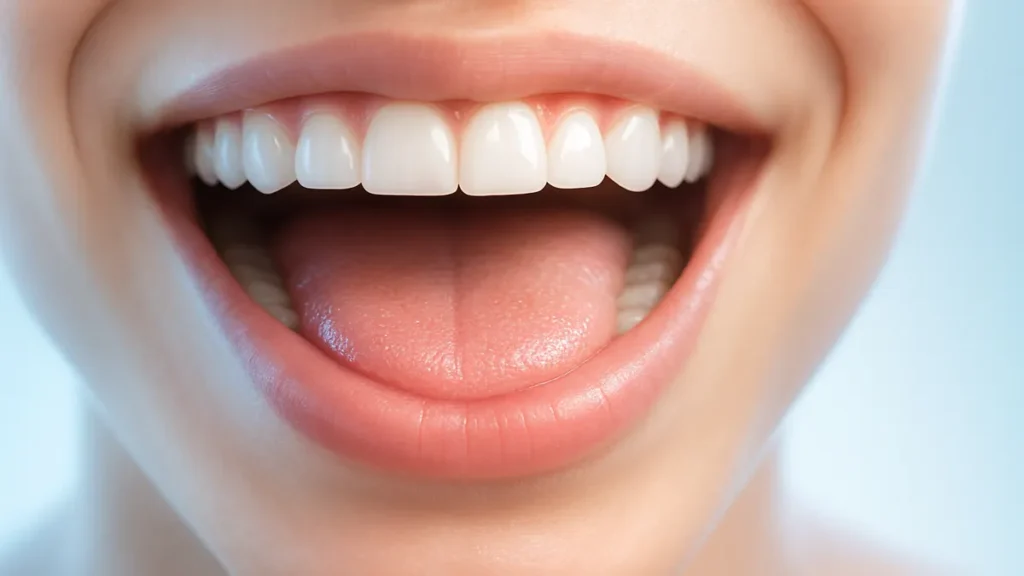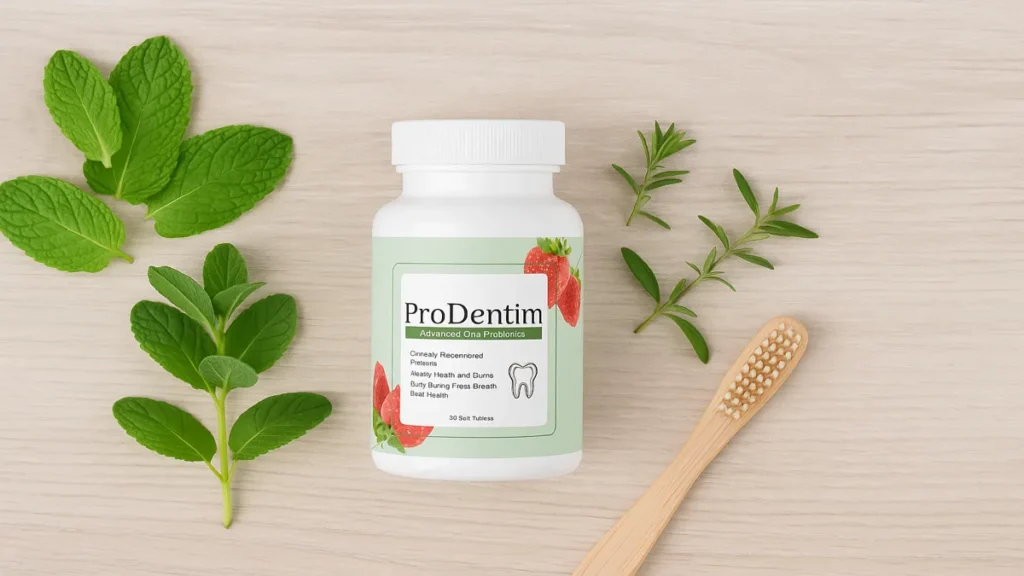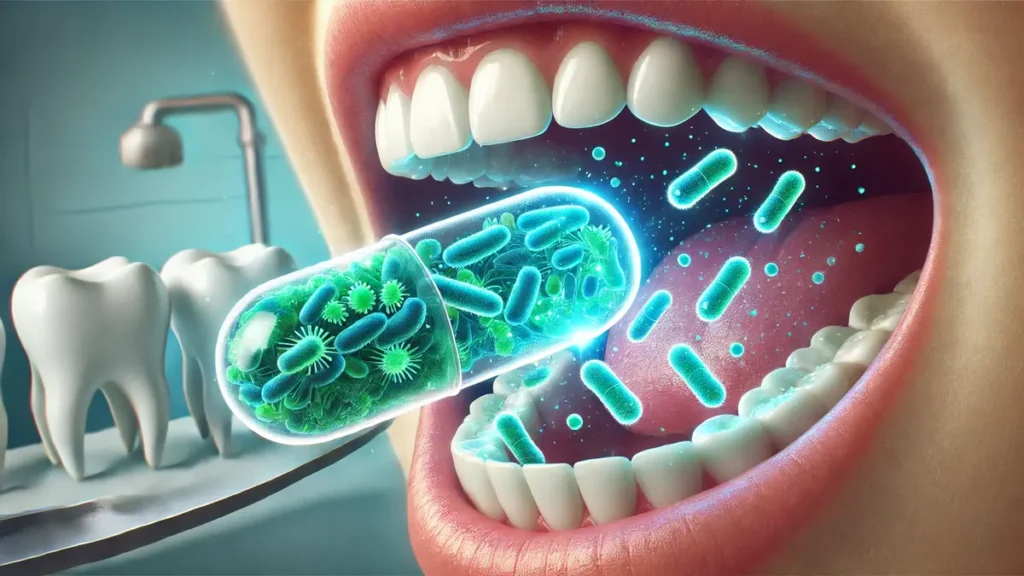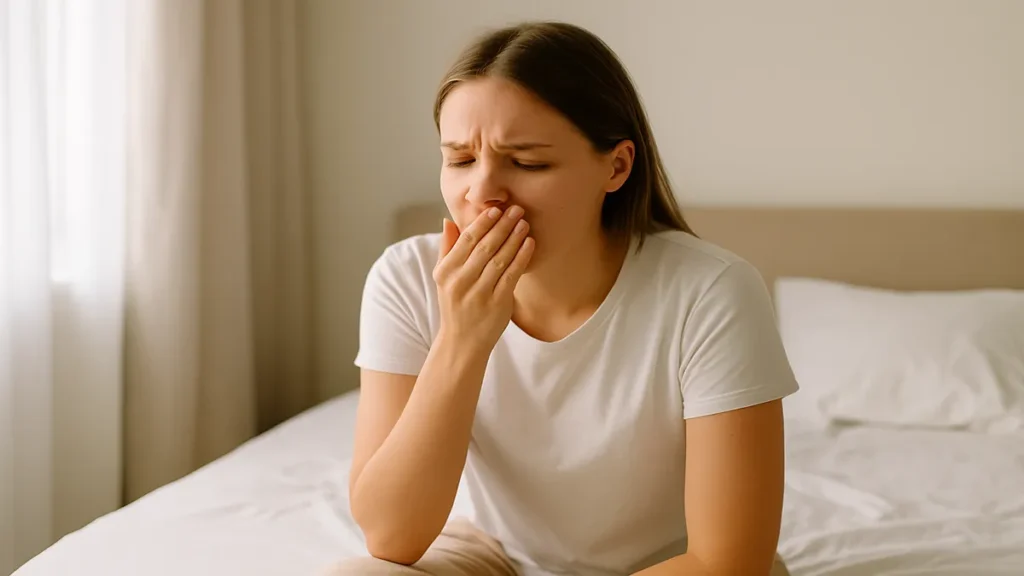
How to get rid of morning breath that won’t go away — even when you brush, floss, and rinse before bed?
If that question haunts you every morning, you’re not alone. You do everything right… yet the sour taste and bad breath are still there.
Morning breath isn’t just a hygiene issue. It’s often caused by dry mouth, bacterial imbalance, and nighttime habits you don’t even think about. And unless you fix the root cause, the odor keeps coming back — no matter what you try.
The good news? You can break the cycle. With smarter habits, targeted support, and a simple plan, you can wake up fresh — for good.
👉 Still dealing with breath issues? See our top-rated oral health solutions here.
What Really Causes Morning Breath
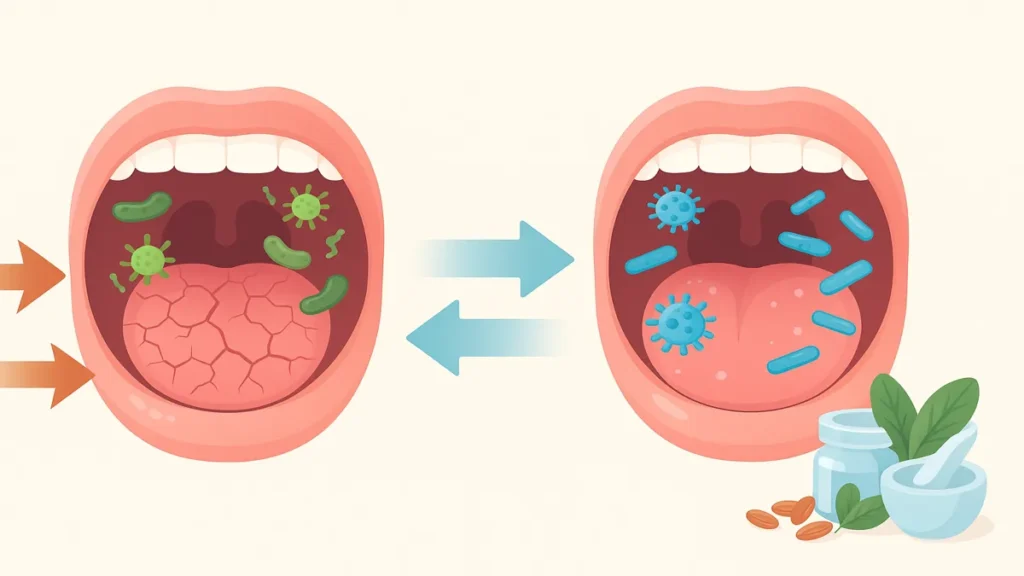
Morning breath isn’t just an annoying side effect of sleep — it’s a real biological process that happens when certain factors align overnight.
First, saliva flow drops significantly while you sleep. Since saliva helps wash away bacteria and neutralize acids, a dry mouth becomes the perfect breeding ground for odor-causing microbes. Without that natural cleansing, bacteria thrive, especially in areas like the back of the tongue, between teeth, and around the gums.
On top of that, many of these bacteria are anaerobic — they live without oxygen and release foul-smelling sulfur compounds as waste. These are the same compounds responsible for that distinct “morning” smell that brushing alone doesn’t fully eliminate.
Your diet plays a role too. Spicy or protein-heavy dinners, late-night snacking, and sugary drinks all feed these bacteria. If you breathe through your mouth while sleeping — which many people do without realizing — it dries out your tissues even more, making things worse.
Stress and digestive issues can contribute as well. High stress levels change your saliva composition and reduce immune function, while acid reflux allows stomach gases to rise into the throat and mouth overnight.
So, if you’re waking up with unpleasant breath, don’t assume your routine is broken. The real problem is what’s happening inside your mouth — and your body — while you sleep.
How to Prevent Bad Breath Overnight
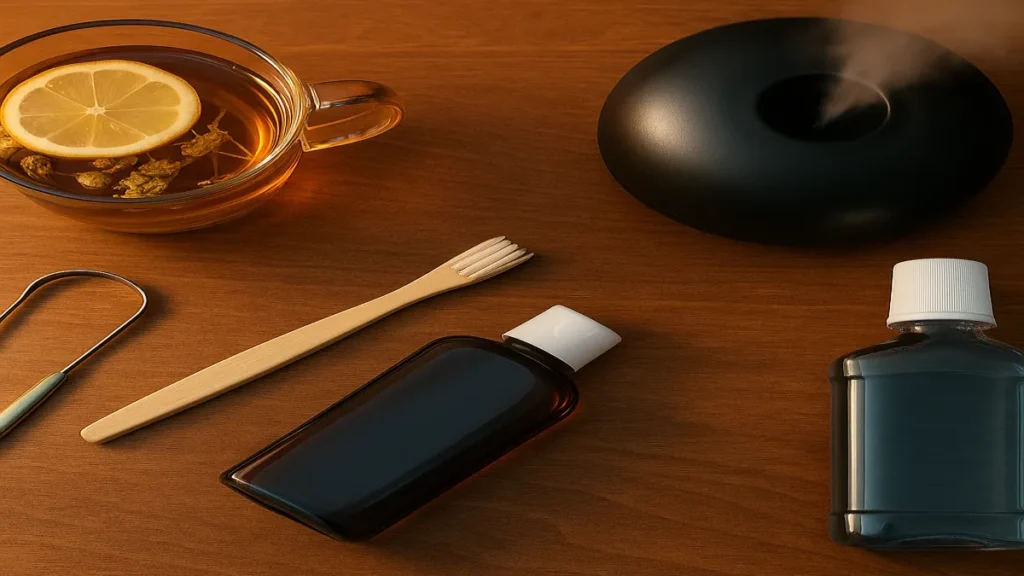
If you want to stop waking up with bad breath, what you do before and during sleep matters just as much as what you do in the morning. Fixing your bedtime routine can make a major difference — especially when the real problem isn’t just food or hygiene, but saliva, bacteria, and airflow.
Clean Your Mouth the Right Way Before Bed
Start by giving your mouth a deep clean — not just a quick brush.
First, use a tongue scraper to remove bacteria and buildup that sit on the back of your tongue. This step alone removes a major source of sulfur-producing microbes.
Next, rinse with a non-alcoholic mouthwash. Alcohol dries out the mouth, making things worse overnight. Look for a pH-balanced rinse with soothing ingredients like aloe or xylitol.
Finally, make sure your last brush happens right before bed — not earlier in the evening. The longer you wait between brushing and sleep, the more time bacteria have to start growing again.
Address Dry Mouth While Sleeping
A dry mouth is a perfect home for smelly bacteria. So staying hydrated inside and out is key.
Try breathing through your nose, not your mouth. If you struggle with this, using a nasal strip or clearing your sinuses before bed helps. You can also run a humidifier in your room to prevent your mouth and throat from drying out while you sleep.
Lastly, consider an herbal tea before bed — not only for relaxation but to gently stimulate saliva. Choose calming options like chamomile or fennel to support both sleep and oral health.
With just a few changes to your bedtime habits, you’ll wake up fresher — and feel more confident facing the day.
Morning Routine That Eliminates Breath Fast

If you wake up with dry mouth and stale breath, your first steps of the day can either mask the issue temporarily — or help solve it for good. A smart morning routine clears bacteria, reactivates saliva flow, and refreshes your breath in just a few minutes.
First tip? Wait to brush your teeth until after breakfast.
Many people brush as soon as they get up, but eating right after reintroduces sugars and food particles that bacteria feed on. Instead, drink a glass of water when you wake up to hydrate your mouth, then eat, then brush.
Right after waking, use a tongue scraper before anything else. The tongue is where most of the odor-producing bacteria live — especially overnight. A quick scrape clears the thick biofilm they create and gives you a fresh starting point.
Then, instead of reaching for harsh mouthwash, try a gentle rinse with baking soda (a pinch in warm water) or unsweetened lemon water. Both neutralize acids and rebalance the pH in your mouth, making it harder for bacteria to grow back fast.
Taken together, these small changes work fast. In less than five minutes, you’ve removed the worst bacteria, restored hydration, and prepared your mouth to stay fresh longer — all before even leaving the house.
👉 Want longer-lasting results? See our top-rated oral health supplement guide for natural support that works from within.
Fix the Root Cause: Rebalance Your Oral Microbiome
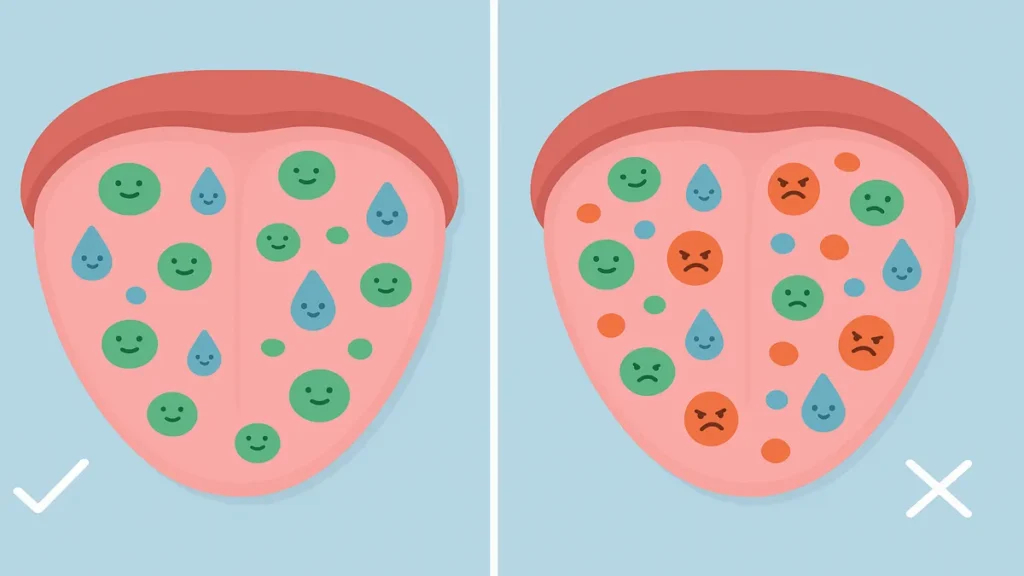
You can brush, floss, and rinse every day — but if your oral microbiome is out of balance, bad breath will keep coming back.
Your mouth hosts over 700 types of bacteria. Some are harmful, but many are beneficial. These protective bacteria help keep odor-causing microbes in check, support gum health, and maintain a neutral pH. When that balance is disrupted — whether from dry mouth, antibiotics, poor diet, or harsh mouthwashes — bad bacteria take over.
This imbalance doesn’t just cause bad breath. It can lead to gum irritation, plaque buildup, and increased tooth sensitivity. The real fix? Restore a healthy population of good bacteria.
Rebalancing your oral microbiome isn’t about killing everything in your mouth. It’s about nurturing the right strains — the ones that reduce sulfur compounds, soothe inflammation, and crowd out the bad guys.
That’s where microbiome-friendly habits come in: avoiding alcohol-based rinses, eating prebiotic-rich foods, and considering targeted oral probiotics. These small, consistent actions help your mouth reset from the inside — leading to long-term freshness, not just a temporary minty feeling.
👉 Looking to support your oral bacteria naturally? Discover our expert-reviewed supplement guide here.
What to Avoid If You Wake Up With Bad Breath

Even with a good routine, some habits can silently sabotage your results. If morning breath keeps coming back, take a closer look at what happens the night before.
Skip the coffee on an empty stomach. While that first cup might feel essential, it dehydrates your mouth and promotes acid buildup — both of which fuel odor-causing bacteria. Try drinking water first, then eat before your caffeine fix.
Always brush your teeth after dinner — not hours before bed. If you snack afterward or forget to brush, food particles stay trapped overnight, feeding harmful microbes while saliva production slows down.
Avoid alcohol and sugary foods late in the evening. Alcohol dries your mouth and weakens your oral defenses, while sugar provides a direct fuel source for bad bacteria.
Avoiding these three common mistakes won’t just reduce odor — it’ll help protect your enamel, gums, and overall oral balance while you sleep.
Final Tips for Long-Term Morning Freshness

Morning breath doesn’t have to be your daily reality. By cleaning your mouth properly at night, hydrating smartly, and adjusting your morning routine, you create the perfect conditions for lasting freshness.
But consistency is key. These small habits only work if you stick with them — every night, every morning.
If you’re ready to stop masking the smell and start fixing the source, focus on your oral microbiome. It’s the foundation of a healthy, odor-free mouth.
👉 Want fresher mornings? Start with the right microbiome support — see our top picks here.
FAQ — Morning Breath Fix: Your Questions Answered
Brushing helps — but it doesn’t remove all bacteria, especially on the tongue and deep in your mouth. Plus, saliva production drops while you sleep, creating the perfect environment for odor-causing microbes to grow back overnight.
Not always. Most cases are linked to dry mouth, poor oral balance, or diet. However, if breath is consistently bad or worsening, it could be related to gum disease, acid reflux, or even tonsil stones. If in doubt, consult your dentist.
Some people notice fresher breath within 3 to 5 days of improving habits. For more lasting results — especially if you’re rebalancing your oral microbiome — it may take 2 to 4 weeks of consistent effort.
Yes. Oral probiotics support beneficial bacteria that crowd out odor-causing strains. They don’t mask the smell — they help restore balance from the inside.



